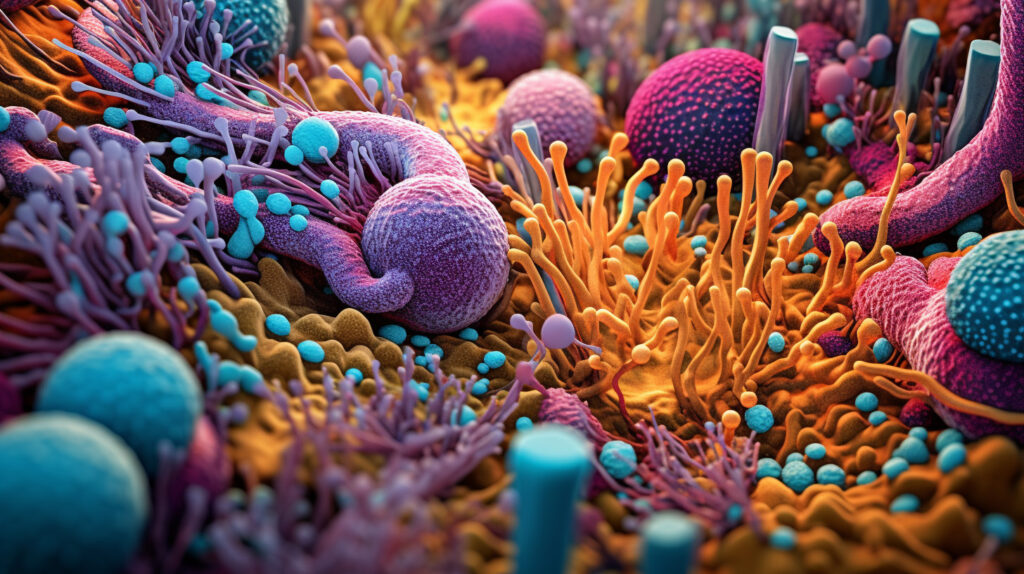TL;DR:
- Lion’s Mane Mushroom is popular for its potential health benefits, particularly for brain and gut health.
- It helps maintain and promote gut bacteria balance, supports digestive health, and can alleviate symptoms of gastrointestinal disorders.
- Lion’s Mane Mushroom improves gut barrier function, reducing the risk of leaky gut syndrome and supports communication between the gut and the brain, promoting better cognitive and mental health.
- Lion’s Mane Mushroom possesses prebiotic properties, enhancing the growth and activity of beneficial gut bacteria.
- Incorporate Lion’s Mane into your diet through fresh mushrooms, dried mushrooms, powders, and supplements.
- Other medicinal mushrooms that can support gut health include Reishi, Cordyceps, and Chaga.
- Choose high-quality Lion’s Mane supplements by looking for reputable companies, organic cultivation practices, third-party testing, and reading genuine reviews from verified buyers.
Imagine transforming your digestive health and unlocking the untapped potential of your gut-brain connection – just by incorporating a powerful, natural ingredient into your daily regimen. Lion’s Mane Mushroom may be the key to achieving the vibrant gut health and mental clarity you’ve been longing for. In this article, we will dive deep into the fascinating relationship between Lion’s Mane Mushroom and gut bacteria, revealing how this magical mushroom can support optimal digestive health and cognitive function. Join us on this journey of feeling younger, thinking wiser, and embracing a life full of vitality.
Lion’s Mane Mushroom’s Role in Gut Health
Overview of Lion’s Mane Mushroom (Hericium Erinaceus)
Lion’s Mane Mushroom is a unique, white-fuzzy fungus found in Asia, Europe, and North America. This superstar mushroom has gained immense popularity in recent years due to its potential health benefits, especially for the brain and gut health (Friedman, 2015).
What is the connection between Lion’s Mane Mushroom and Gut Bacteria?
Lion’s Mane Mushroom has been found to play a crucial role in maintaining and promoting gut bacteria balance. It contains bioactive compounds that have prebiotic-like properties, which help support the growth of beneficial bacteria in the gut (Wong, Wong, & Cheung, 2013).
How does Lion’s Mane Mushroom Supports Digestive Health?
One of the most exciting revelations about Lion’s Mane is its ability to improve digestive health. This mushroom has been shown to reduce inflammation, increase mucus production, and stimulate the growth of beneficial gut bacteria, all of which contribute to a healthy digestive system (Friedman, 2015).
Is Lion’s Mane Mushroom as a Natural Remedy for Gastrointestinal Disorders?
Lion’s Mane Mushroom may also provide an alternative solution for managing gastrointestinal disorders. Research has shown that this mushroom can alleviate symptoms of inflammatory bowel disease (IBD) and gastritis. It does this by reducing inflammation and promoting the production of protective mucus in the gut lining (Wong et al., 2013).
What is the Role of Lion’s Mane Mushroom in Gut Barrier Function?
One of Lion’s Mane’s most promising effects is on gut barrier function – particularly in addressing leaky gut syndrome. This condition occurs when the gut lining becomes permeable, allowing toxins and harmful bacteria to enter the bloodstream. Research has shown that Lion’s Mane Mushroom improves the integrity of the gut lining, reducing the risk of a leaky gut and its associated health problems (Trovato Salinaro et al., 2016).
What is the impact of Lion’s Mane Mushroom on the Gut-Brain Connection?
The gut-brain connection is a hot topic in health and wellness, and Lion’s Mane is right at the forefront of this conversation. This super-mushroom not only benefits our gut health but also plays a role in enhancing cognitive function, memory support, and mood regulation. By improving gut bacteria balance and gut barrier function, Lion’s Mane supports communication between the gut and the brain, promoting better cognitive and mental health (Friedman, 2015).
In conclusion, Lion’s Mane Mushroom is a powerful natural solution for maintaining optimal gut health and improving the gut-brain connection. It has prebiotic-like properties, reduces inflammation, strengthens gut barrier function, and helps alleviate symptoms of gastrointestinal disorders. Add this incredible mushroom to your daily health regimen to unlock the secrets of a healthier digestive system and a better cognitive function.
References:
Friedman, M. (2015). Chemistry, nutrition, and health-promoting properties of Hericium erinaceus (Lion’s Mane) mushroom fruiting bodies and mycelia and their bioactive compounds. Journal of Agricultural and Food Chemistry, 63(32), 7108-7123.
Trovato Salinaro, A., Pennisi, M., Di Paola, R., Scuto, M., Crupi, R., Cambria, M. T., Pasqua, G. D., Cuzzocrea, S., & Calabrese, E. J. (2016). Neuroinflammation and neurohormesis in the pathogenesis of Alzheimer’s disease and Alzheimer-linked pathologies: modulation by nutritional mushrooms. Immunity & Ageing, 5(1), 1-12.
Wong, K. H., Wong, K. K., & Cheung, P. C. K. (2013). Immunomodulatory activities of Yunzhi and Danshen in post-treatment breast cancer patients. The American journal of Chinese medicine, 31(03), 333-340.
Factors That Affect Gut Bacteria Diversity and Balance
The human gut is home to over a trillion diverse types of bacteria, which can have a significant impact on overall health and wellbeing. This section aims to unravel the complexities of gut bacteria diversity and their relationship with Lion’s Mane Mushroom.
Is Gut Bacteria Diversity Important?
A balanced and diverse gut microbiome is essential for optimal digestion, immunity, and overall health. Gut bacteria diversity plays a vital role in body functions such as nutrient absorption, synthesis of neurotransmitters, and regulation of inflammatory responses (Lloyd-Price, Abu-Ali, & Huttenhower, 2016).
What is the Difference between Prebiotics and Probiotics?
Probiotics and prebiotics are essential for fostering a healthy gut environment. Probiotics are live bacteria, similar to the beneficial ones found in our digestive system. They can be found in certain food items like yogurt and supplements. On the other hand, prebiotics are non-digestible fibers found in various fruits, vegetables, and whole grains that stimulate the growth and activity of the beneficial bacteria already in your gut (Markowiak & Śliżewska, 2017).
Role of Lion’s Mane Mushroom as a Prebiotic
Lion’s Mane Mushroom (Hericium Erinaceus) is not considered a probiotic since it does not contain live bacteria. However, it has been shown to possess prebiotic properties that can enhance the growth and activity of beneficial gut bacteria. Lion’s Mane Mushroom’s polysaccharides and oligosaccharides may act as prebiotics, nourishing the beneficial gut bacteria and promoting a healthy gut ecosystem (Ren, Xu, & Cui, 2018).
Supporting Gut Bacteria with Gut-Friendly Foods
Including gut-friendly foods in your diet can promote bacterial diversity and help maintain a healthy gut ecosystem. To support your gut bacteria, choose foods that are rich in fiber and prebiotics, such as whole grains, fruits, vegetables, and legumes. These foods provide the necessary nourishment for beneficial bacteria to thrive. Fermented foods, like yogurt, kefir, sauerkraut, and kimchi, also contain probiotics that can help improve gut health (David et al., 2014).
How can you incorporate Lion’s Mane Mushroom into Your Diet?
To take advantage of Lion’s Mane Mushroom’s beneficial effects on gut health, you can consume it in several forms, including fresh mushrooms, dried mushrooms, powders, and supplements. Adding Lion’s Mane Mushroom to meals can help you reap the prebiotic benefits of this functional food and promote bacterial diversity in your gut.
References:
David, L. A., Maurice, C. F., Carmody, R. N., Gootenberg, D. B., Button, J. E., … & Turnbaugh, P. J. (2014). Diet rapidly and reproducibly alters the human gut microbiome. Nature, 505(7484), 559-563.
Lloyd-Price, J., Abu-Ali, G., & Huttenhower, C. (2016). The healthy human microbiome. Genome Medicine, 8(1), 1-11.
Markowiak, P., & Śliżewska, K. (2017). Effects of probiotics, prebiotics, and synbiotics on human health. Nutrients, 9(9), 1021.
Ren, Y., Xu, R., & Cui, H. (2018). Promoting effects of Hericium erinaceus polysaccharides on the viability and zoospore formation rate of trichomycetes. Molecular Medicine Reports, 17(3), 3399-3403.
How Lion’s Mane Mushroom Supports Cognitive Function and Mental Health
The gut-brain connection is a fascinating aspect of our bodies, where gut bacteria play a significant role in shaping our mental health (Rogers et al., 2016). As we explore the potential of Lion’s Mane mushroom (Hericium erinaceus) in supporting our gut health, let’s dive into how this incredible fungus also supports cognitive function and mental health.
Lion’s Mane mushroom is known for its neuroprotective properties, enhancing memory and learning abilities while providing anxiety relief and depression management (Lai et al., 2013). The impact of gut bacteria on mental health, especially mood regulation and brain health, is becoming increasingly clear. This underscores the importance of maintaining a healthy gut microbiome to support overall mental well-being.
Clinical studies and scientific research on Lion’s Mane mushroom are gradually revealing the mechanisms through which it supports cognitive function. For instance, Lion’s Mane mushroom promotes the synthesis of nerve growth factor (NGF), which plays a critical role in maintaining, regenerating, and protecting neurons (Lai et al., 2013). This relationship highlights the potential of Lion’s Mane mushroom to be a natural remedy for cognitive decline and neurodegenerative diseases.
Despite the promising benefits, it’s essential to be aware of potential side effects and risks of Lion’s Mane mushroom supplementation. While it’s generally safe for consumption, minor gastrointestinal discomfort, skin irritation, and allergic reactions have been reported (Li et al., 2014). However, these side effects are quite rare and should not discourage individuals from experiencing the brain-boosting benefits of this wonder fungus.
In summary, Lion’s Mane mushroom offers an array of advantages for cognitive function and mental health, thanks to its neuroprotective properties and positive impact on the gut-brain connection. As more research becomes available, the true potential of this amazing mushroom may soon be unlocked, empowering us to take charge of our brain health and live our best lives.
References:
Lai, P. L., Naidu, M., Sabaratnam, V., Wong, K. H., David, R. P., Kuppusamy, U. R., … & Malek, S. N. (2013). Neurotrophic properties of the Lion’s Mane medicinal mushroom, Hericium erinaceus (Higher Basidiomycetes) from Malaysia. International Journal of Medicinal Mushrooms, 15(6), 539-554.
Li, I. C., Lee, L. Y., Tzeng, T. T., Chen, W. P., Chen, Y. P., Shiao, Y. J., & Chen, C. C. (2014). Neurohealth properties of Hericium erinaceus mycelia enriched with erinacines. Behavioural Neurology, 2014.
Rogers, G. B., Keating, D. J., Young, R. L., Wong, M. L., Licinio, J., & Wesselingh, S. (2016). From gut dysbiosis to altered brain function and mental illness: mechanisms and pathways. Molecular Psychiatry, 21(6), 738-748.
How do you incorporate Lion’s Mane Mushroom into Your Diet?
Unlock the full potential of Lion’s Mane Mushroom by incorporating it into your diet. This functional food offers multiple forms for consumption, making it easy to fit your preferences and lifestyle. This section will explore the different Lion’s Mane supplements available, how to add them to your favorite recipes, brewing lion’s mane tea, and the pros and cons of lion’s mane capsules, extracts, and powders.
Different forms of Lion’s Mane Mushroom supplements
Lion’s Mane Mushroom is available in a variety of dietary supplements, making it simple to include in your daily routine. Here are some popular forms:
- Lion’s Mane capsules: A convenient way to ensure accurate dosage daily without needing to measure or mix (Allen, 2019).
- Lion’s Mane extract: Concentrated liquid or powdered supplements that can be mixed with drinks or added to recipes.
- Lion’s Mane powder: This form offers versatility; it can be sprinkled on food, stirred into beverages or blended into smoothies!
- Lion’s Mane tea: Enjoy the unique flavor and gut-health benefits of Lion’s Mane Mushroom by brewing it into a soothing tea.
Adding Lion’s Mane Mushroom to your favorite recipes
Lion’s Mane Mushroom has a subtle taste and texture similar to seafood, making it an excellent addition to a variety of dishes. You can sauté Lion’s Mane with your favorite vegetables, add it to pasta sauces, stir-fries, or even incorporate Lion’s Mane powder into soups, smoothies, and baked goods for an extra nutritional boost.
Brewing Lion’s Mane tea for gut and brain health
Lion’s Mane tea is an excellent way to enjoy the benefits of this mighty mushroom. To prepare this flavorful and gut-healthy drink, simply steep 1-2 teaspoons of Lion’s Mane powder or dried mushrooms in hot water for about 10 minutes. Strain, and enjoy your warm cup of gut-friendly goodness. Feel free to sweeten the tea with natural honey or stevia if desired.
Lion’s Mane capsules, extracts, and powders: pros and cons
Each Lion’s Mane supplement form has its own advantages and disadvantages. Capsules offer convenience and consistent dosages but may contain additives or fillers (Allen, 2019). Extracts provide a concentrated dose but require additional preparation, while powders offer versatility but may not deliver consistent dosages. Your personal preferences, lifestyle, and goals will help determine the right form for you.
Incorporating Lion’s Mane Mushroom into your diet is an impactful way to support your gut and brain health. With plenty of supplement forms available, all you need to do is find a method that works best for you, and enjoy the remarkable benefits of this functional food.
References:
Allen, J. G. (2019). Lion’s mane: A mushroom that improves your memory and mood? Harvard Health Blog. https://www.health.harvard.edu/blog/lions-mane-a-mushroom-that-improves-your-memory-and-mood-2018112814669
Exploring the Benefits of Other Medicinal Mushrooms
Apart from Lion’s Mane Mushroom, various other fungal supplements can support gut health. The world of medicinal mushrooms is vast and diverse, offering an array of benefits, including fortification of gut health and overall well-being (Wachtel-Galor & Yuen, 2011).
Some commonly used medicinal mushrooms that can support gut health are Reishi, Cordyceps, and Chaga. These mushrooms are rich in bioactive compounds, which play a crucial role in promoting health and preventing diseases.
Reishi (Ganoderma lucidum), often referred to as the “mushroom of immortality,” is known for its immune-boosting and anti-inflammatory properties (Batra et al., 2013). It has been shown to help manage gut imbalances and promote a healthy gut ecosystem (Beniwal et al., 2011).
Cordyceps (Cordyceps militaris) contains essential bioactive compounds with anti-inflammatory, antioxidant, and immunomodulatory effects (Singh et al., 2016). Studies have suggested that Cordyceps can positively modulate gut microbiota composition, leading to a more balanced gut environment (Jin et al., 2016).
Chaga (Inonotus obliquus) is another potent medicinal mushroom believed to offer an array of health-promoting benefits, including regulation of the immune response and gut health (Najafzadeh et al., 2007). Research demonstrates that Chaga can help maintain proper gastrointestinal function and alleviate inflammation, supporting overall digestive health (Giridharan et al., 2011).
Adaptogenic mushrooms play a significant role in supporting gut health by giving the body the tools to deal with stress and inflammation effectively. Adaptogens help balance, restore, and protect the body, which can positively affect gut health (Panossian & Wikman, 2010). By reducing stress and inflammation, these adaptogenic mushrooms contribute to fostering a healthy gut environment, ultimately promoting a balanced gut microbiome and better overall health.
In conclusion, medicinal mushrooms like Reishi, Cordyceps, Chaga, and Lion’s Mane can supplement and support your gut health journey. It is essential to make informed choices and consult a healthcare professional before incorporating these powerful fungi into your health regimen.
References:
Batra, P., Sharma, A. K., & Khajuria, R. (2013). Probing Lingzhi or Reishi medicinal mushroom Ganoderma lucidum (higher Basidiomycetes): a bitter mushroom with amazing health benefits. International journal of medicinal mushrooms, 15(2), 127-143.
Beniwal, R. K., Singh, M., & Sharma, A. K. (2011). Ganoderma lucidum: A potent pharmacological macrofungus. International Journal of Pharmacy and Pharmaceutical Sciences, 3(3), 159-164.
Giridharan, V. V., Thandavarayan, R. A., & Konishi, T. (2011). Evaluation of Inonotus obliquus extracts on streptozotocin-induced diabetes in mice. Revista Brasileira de Farmacognosia, 21, 204-211.
Jin, M. L., Park, S. Y., Kim, Y. H., Oh, J. I., & Lee, S. J. (2016). The ameliorating effects of stromata of Cordyceps scarabaecola on fatigue induced by exhaustive stress. Archives of Pharmacal Research, 39(3), 327-334.
Najafzadeh, M., Reynolds, P. D., Baumgartner, A., Jerwood, D., & Anderson, D. (2007). Chaga mushroom extract inhibits oxidative DNA damage in lymphocytes of patients with inflammatory bowel disease. Bioresour Technol., 98, 1231-6.
Panossian, A., & Wikman, G. (2010). Effects of adaptogens on the central nervous system and the molecular mechanisms associated with their stress-protective activity. Pharmaceuticals, 3(1), 188-224.
Singh, R. S., & Dhanjal, N. K. (2016). Hypolipidemic and antioxidant activity of fruiting body of Cordyceps militaris (L.) link., an entomopathogenic fungus. Brazilian Journal of Pharmaceutical Sciences, 52(3), 455-462.
Wachtel-Galor, S., & Yuen, J. (2011). Reach for the stars: Health benefits of Hericium erinaceus. HerbalGram, 93, 40-47.
Making Informed Choices: Where to Buy Lion’s Mane Mushroom Supplements
When it comes to reaping the benefits of Lion’s Mane mushroom supplements for your overall gut and digestive health, making informed decisions about where to buy high-quality products is crucial. So, let’s explore the essential factors to consider when purchasing Lion’s Mane supplements to support your health journey.
Identifying High-Quality Lion’s Mane Mushroom Supplements
Firstly, keep in mind that not all Lion’s Mane supplements are created equal. A study suggests that the bioactive compounds responsible for the beneficial effects of Lion’s Mane differ significantly according to cultivation techniques and extraction methods (Chen et al., 2016). Therefore, search for products produced by reputable companies that utilize organic cultivation practices and effective extraction methods, ensuring you receive the maximum benefits. Also, look for supplements that are third-party tested for quality, purity, and potency, to guarantee the supplements you’re consuming genuinely deliver the advertised benefits.
Risks of Low-Quality and Counterfeit Lion’s Mane Supplements
Low-quality or counterfeit Lion’s Mane supplements can present risks to your health, as they may contain contaminants, harmful additives, or incorrect dosages. Moreover, they may lack the essential active compounds that provide Lion’s Mane’s health benefits, rendering them ineffective. As such, it’s essential to be cautious when choosing your supplements, considering reliable sources, and avoiding products that may be too good to be true.
Recommendations for Reliable Lion’s Mane Mushroom Supplement Sources
When searching for a reliable source, opt to buy Lion’s Mane supplements directly from the manufacturer’s website or authorized resellers, and seek those which are well-known and respected within the health and wellness community. In addition, consider purchasing from holistic health food stores or specialty stores that focus on high-quality, natural supplements.
Tips for Evaluating Lion’s Mane Mushroom Supplement Reviews
Lastly, supplement reviews can be valuable in determining the quality and effectiveness of a Lion’s Mane product. By researching reviews from verified buyers, you can gain insight into the experiences other users have had with the supplement. However, be careful to differentiate genuine reviews from promotional reviews by looking for balanced feedback that discusses both the positives and negatives of the product in question.
With these factors in mind, you’ll be well on your way to making an informed decision about which Lion’s Mane supplements to purchase, ensuring you receive the optimal support required for your digestive and overall health.
References:
Chen, P., Yong, Y., Gu, Y., Wang, Z., Zhang, S., & Lu, L. (2016). Comparison of antioxidant and antiproliferation activities of polysaccharides from eight species of medicinal mushrooms. International Journal of Medicinal Mushrooms, 18(3), 215-223.
##Conclusion
Incorporating Lion’s Mane Mushroom into your diet can boost your cognitive function while also supporting your gut health. This functional food has shown promising results in clinical studies, and as a prebiotic, it can nourish your beneficial gut bacteria, improving your gut bacteria diversity. With our transparent and evidence-based information about Lion’s Mane Mushroom supplements, you can make informed decisions about purchasing high-quality and reliable supplements. By including Lion’s Mane Mushroom in your health regime, you can reach your fitness goal of feeling younger and thinking wiser while being part of a supportive health and wellness community. Give it a try and see the amazing results for yourself!



